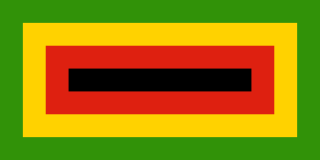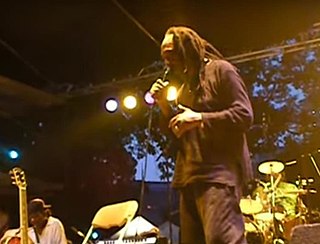Chimurenga is a word in the Shona language meaning "revolutionary struggle" or uprising.
Contents
"Chimurenga" may also refer to:
Chimurenga is a word in the Shona language meaning "revolutionary struggle" or uprising.
"Chimurenga" may also refer to:

The Gukurahundi was a series of mass killings in Zimbabwe which were committed from 1983 until the Unity Accord in 1987. The name derives from a Shona-language term which loosely translates to "the early rain which washes away the chaff before the spring rains".

Zimbabwean music is heavily reliant on the use of instruments such as the mbira, Ngoma drums and hosho. Their music symbolizes much more than a simple rhythm, as the folk and pop style styled music was used as a symbol of hope for Zimbabweans looking to gain independence from Rhodesia. Music has played a significant role in the history of Zimbabwe, from a vital role in the traditional Bira ceremony used to call on ancestral spirits, to protest songs during the struggle for independence. The community in Zimbabwe used music to voice their resistance to their oppression, as one of the only weapons they had available to fight back with. In the eighties, the Music of Zimbabwe was at the center of the African Music scene thanks to genres such as Sungura and Jit. However, several performers were banned by state TV and radio leading to the closing of several music venues.

The Zimbabwe African National Union (ZANU) was a militant socialist organisation that fought against white-minority rule in Rhodesia, formed as a split from the Zimbabwe African People's Union (ZAPU) in 1963. ZANU split in 1975 into wings loyal to Robert Mugabe and Ndabaningi Sithole, later respectively called ZANU–PF and ZANU–Ndonga. These two sub-divisions ran separately at the 1980 general election, where ZANU–PF has been in power ever since, and ZANU–Ndonga a minor opposition party.

Thomas Tafirenyika Mapfumo is a Zimbabwean musician. He is nicknamed "The Lion of Zimbabwe" and "Mukanya" for his immense popularity and for the political influence he wields through his music, including his sharp criticism of the government of former Zimbabwean president Robert Mugabe. He both created and popularized Chimurenga music, and is known for his distinctive voice and slow-moving style.
Chimurenga is a word in Shona. The Ndebele equivalent is not as widely used since most Zimbabweans speak Shona; it is Umvukela, meaning "revolutionary struggle" or uprising. In specific historical terms, it also refers to the Ndebele and the Shona insurrections against administration of the British South Africa Company during the late 1890s, the First Chimurenga—and the war fought between African nationalist guerrillas and the predominantly-white Rhodesian government during the 1960s and the 1970s, the Rhodesian Bush War, or the Second Chimurenga/Imvukela.

Matabeleland is a region located in southwestern Zimbabwe that is divided into three provinces: Matabeleland North, Bulawayo, and Matabeleland South. These provinces are in the west and south-west of Zimbabwe, between the Limpopo and Zambezi rivers and are further separated from Midlands by the Shangani River in central Zimbabwe. The region is named after its inhabitants, the Ndebele people who were called "Amatabele"(people with long shields – Mzilikazi 's group of people who were escaping the Mfecani wars). Other ethnic groups who inhabit parts of Matabeleland include the Tonga, Bakalanga, Venda, Nambya, Khoisan, Xhosa, Sotho, Tswana, and Tsonga.

Zimbabwe has many different cultures, which may include beliefs and ceremonies, one of them being Shona. Zimbabwe's largest ethnic group is Shona.
Shona music is the music of the Shona people of Zimbabwe. There are several different types of traditional Shona music including mbira, singing, hosho and drumming. Very often, this music will be accompanied by dancing, and participation by the audience. In the Shona style of music, there is little distinction between the performer and the audience. Both are often actively involved in the music-making and both are important in the Shona religious ceremonies.
Ephat Mujuru (1950–2001), was a Zimbabwean musician, one of the 20th century's finest players of the mbira, a traditional instrument of the Shona ethnic group of Zimbabwe.

The Shona people are a Bantu ethnic group native to Southern Africa, primarily living in Zimbabwe where they form the majority of the population, as well as Mozambique, South Africa, and a worldwide diaspora. There are five major Shona language/dialect clusters: Manyika, Karanga, Zezuru, Korekore, and Ndau.

Zimbabwe African National Liberation Army (ZANLA) was the military wing of the Zimbabwe African National Union (ZANU), a militant African nationalist organisation that participated in the Rhodesian Bush War against white minority rule of Rhodesia.

Nehanda Charwe Nyakasikana also known as Mbuya Nehanda was a svikiro, or spirit medium of the Zezuru Shona people. She was a medium of Nehanda, a female Shona mhondoro. As one of the spiritual leaders of the Shona, she was one of the leaders of a revolt, the Chimurenga, against the British South Africa Company's colonisation of what is now Zimbabwe led by Cecil John Rhodes in 1889. She was a Hera of the HwataShava Mufakose Dynasty. She and her ally Sekuru Kaguvi were eventually captured and executed by the company on charges of murder. She has been commemorated by Zimbabweans by statues, songs, novels, and poems, and the names of streets and hospitals. The legacy of the medium continued to be linked to the theme of resistance, particularly the guerrilla war that began in 1972. Her name became of increasing importance to the nationalist movements in Zimbabwe.
Aeneas Soko Chigwedere was a Zimbabwean politician, historian, educationist, and traditional leader. He served as the Minister of Education, Sports, & Culture since August 2001, and was appointed the Resident Minister and Governor of Mashonaland East Province in August 2008. He was installed as Headman Svosve Mubayiwa on 10 March 2008. On 22 January 2021, he died at his farm near Marondera following COVID-19 related complications during the COVID-19 pandemic in Zimbabwe.

Sekuru Kaguvi, was a svikiro (medium), a traditionalist leader in pre-colonial Zimbabwe, and a leader in the Shona rebellion of 1896-1897 against European rule, known as the First Chimurenga. The sobriquet "Kaguvi" was a designation given at times those who were said to speak for the traditional Shona supreme deity Mwari.
Chimurenga music is a Zimbabwean popular music genre coined and popularized by Thomas Mapfumo. Chimurenga is a Shona language word for liberation, which entered common usage during the Rhodesian Bush War. The word's modern interpretation has been extended to describe a struggle for human rights, political dignity and social justice. Mapfumo developed a style of music based on traditional Shona mbira music, but played with modern electric instrumentation, with lyrics characterized by social and political commentary.

The military history of Zimbabwe chronicles a vast time period and complex events from the dawn of history until the present time. It covers invasions of native peoples of Africa, encroachment by Europeans, and civil conflict.
Europeans first came to the region in southern Africa today called Zimbabwe in the sixteenth century, when Portuguese colonials ventured inland from Mozambique and attacked the Kingdom of Mutapa, which then controlled an area roughly equivalent to eastern Zimbabwe and western Mozambique. Portuguese influence over Mutapa endured for about two centuries before fading away during the 1690s and early-1700s (decade). During the year of 1685, French Huguenots emigrated to present-day South Africa and whilst some settled there, others moved further north into the continent. Those who did, settled within modern-day Zimbabwe, Mozambique and Botswana, and co-existed with the indigenous people; most of whom, in Zimbabwe, were the Naletale people.

The Geneva Conference took place in Geneva, Switzerland during the Rhodesian Bush War. Held under British mediation, its participants were the unrecognised government of Rhodesia, led by Ian Smith, and a number of rival Rhodesian black nationalist parties: the African National Council, led by Bishop Abel Muzorewa; the Front for the Liberation of Zimbabwe, led by James Chikerema; and a joint "Patriotic Front" made up of Robert Mugabe's Zimbabwe African National Union and the Zimbabwe African People's Union led by Joshua Nkomo. The purpose of the conference was to attempt to agree on a new constitution for Rhodesia and in doing so find a way to end the Bush War raging between the government and the guerrillas commanded by Mugabe and Nkomo respectively.

The Victoria Falls Conference took place on 26 August 1975 aboard a South African Railways train halfway across the Victoria Falls Bridge on the border between the unrecognised state of Rhodesia and Zambia. It was the culmination of the "détente" policy introduced and championed by B. J. Vorster, the Prime Minister of South Africa, which was then under apartheid and was attempting to improve its relations with the Frontline States to Rhodesia's north, west and east by helping to produce a settlement in Rhodesia. The participants in the conference were a delegation led by the Rhodesian Prime Minister Ian Smith on behalf of his government, and a nationalist delegation attending under the banner of Abel Muzorewa's African National Council (UANC), which for this conference also incorporated delegates from the Zimbabwe African National Union (ZANU), the Zimbabwe African People's Union (ZAPU) and the Front for the Liberation of Zimbabwe (FROLIZI). Vorster and the Zambian President Kenneth Kaunda acted as mediators in the conference, which was held on the border in an attempt to provide a venue both sides would accept as neutral.